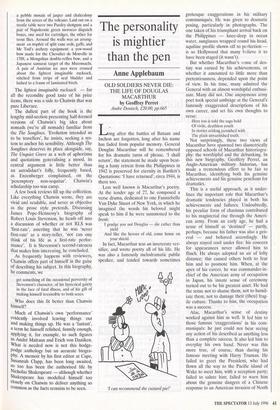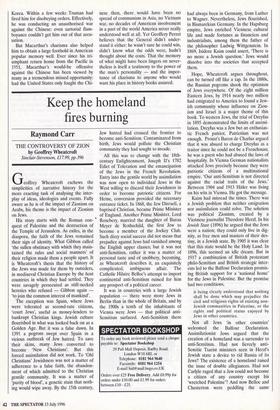The personali is mightier than the pen
Anne Applebaum OLD SOLDIERS NEVER DIE: THE LIFE OF DOUGLAS MACARTHUR by Geoffrey Perret Andre Deutsch, £20.00, pp.665 Long after the battles of Bataan and Inchon are forgotten, long after his name has faded from popular memory. General Douglas Macarthur will be remembered for his dramatic turns of phrase. 'I shall return', the statement he made upon beat- ing a hasty retreat from the Philippines in 1942 is preserved for eternity in Bartlett's Quotations: 'I have returned', circa 1944, is there too.
Less well known is Macarthur's poetry. At the tender age of 27, he composed a verse drama, dedicated to one Fanniebelle Van Dyke Stuart of New York, in which he imagined the words his beloved might speak to him if he were summoned to the front:
I grudge you not Douglas — die rather than yield
And like the heroes of old, come home on your shield.
In fact, Macarthur was an inveterate ver- sifier, and wrote poetry all of his life. He was also a famously melodramatic public speaker, and tended towards sometimes can recommend the custard piel ' grotesque exaggerations in his military communiqués. He was given to dramatic posing, particularly in photographs. The one taken of his triumphant arrival back on the Philippines — knee-deep in ocean water, sunglasses wrapped round his head, aquiline profile shown off to perfection is so Hollywood that many believe it to have been staged (it wasn't).
But whether Macarthur's sense of des- tiny was earned by his achievements, or whether it amounted to little more than pretentiousness, depended upon the point of view. In his time, many admired the General with an almost worshipful enthusi- asm. Many did not. One anonymous army poet took special umbrage at the General's famously exaggerated descriptions of his own career, and set his own thoughts to verse:
Here too is told the saga bold Of virile, deathless youth In stories seldou4 tarnished with The plain unvarnished truth.
Not surprisingly, these two views of Macarthur have spawned two diametrically opposed schools of Macarthur historiogra- phy: the worshipful and the debunking. In this new biography, Geoffely Perret, an Anglo-American military historian, has made a tremendous effort to be fair to Macarthur, identifying both his genuine achievements and his genuine penchant for dramatics.
This is a useful approach, as it under- lines the important role that Macarthur's dramatic tendencies played in both his achievements and failures. Undoubtedly, his peculiar form of charisma contributed to his magisterial rise through the Ameri- can army. From an early age, he had a sense of himself as 'destined' — partly, perhaps, because his father was also a gen- eral — and behaved accordingly. He always stayed cool under fire: his concern for appearances never allowed him to flinch. He always adopted an air of lofty distance; this caused others both to fear him and to promote him. When, at the apex of his career, he was commander-in- chief of the American army of occupation in Japan, his innate sense of ceremony turned out to be his greatest asset. He had the sense not to shame them, not to humil- iate them, not to damage their (then) frag- ile culture. Thanks to him, the occupation was a success.
Alas, Macarthur's sense of destiny worked against him as well. It led him to those famous 'exaggerations' in his com- muniqués: he just could not bear seeing any action of his described as anything less than a complete success. It also led him to overplay his own hand. Never was this more true, of course, than during his famous meeting with Harry Truman. He failed to greet the President, who had flown all the way to the Pacific island of Wake to meet him, with a reception party; failed to salute him; failed to warn him about the genuine dangers of a Chinese response to an American invasion of North Korea. Within a few weeks Truman had fired him for disobeying orders. Effectively, he was conducting an unauthorised war against the Chinese: even sartorial flam- boyance couldn't get him out of that accu- sation.
But Macarthur's charisma also helped him to obtain a large foothold in American popular memory well. Ever since his tri- umphant return home from the Pacific in 1951, Macarthur's would-be offensive against the Chinese has been viewed by many as a tremendous missed opportunity: had the United States only fought the Chi- nese then, there would have been no spread of communism in Asia, no Vietnam war, no decades of American involvement in a part of the world America never really understood well at all. Yet Geoffery Perret believes that the General didn't under- stand it either: he wasn't sure he could win, didn't know what the odds were, hadn't thought about the costs. That the memory of what might have been lingers on never- theless is itself a testimony to the power of the man's personality — and the impor- tance of charisma to anyone who would want his place in history books assured.



































































 Previous page
Previous page